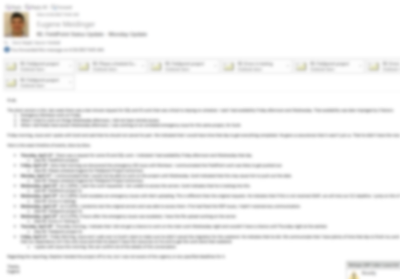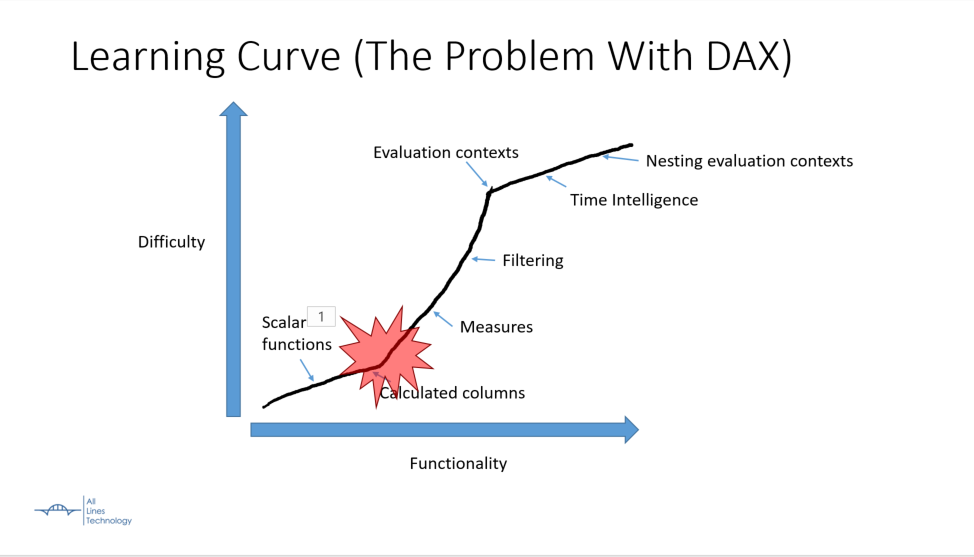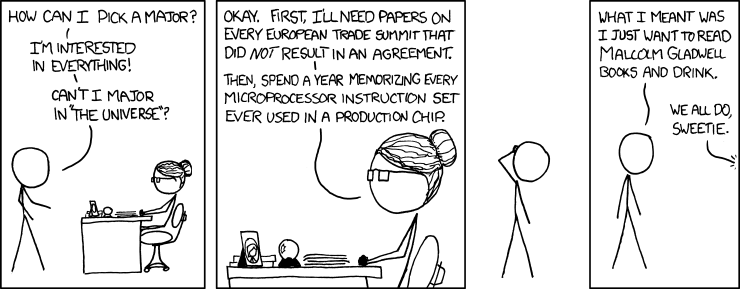Recently, I’ve been going through a lot of the presentations for GroupBy.org. I’m trying to provide as much feedback as I can, because I think good feedback is hard work. A lot of the existing comments are along the lines of “This looks cool!”, which does not provide much direction. As a presenter myself, I’m a big fan of receiving actionable criticism. It’s the only way I will grow as a presenter.
This post is going to cover some general guidance for making a fantastic abstract. It’s targeted at the GroupBy.org site, but much of the advice is broadly applicable
You should write like you fight
When you edit your abstract, you should be relentless, you should be merciless. Every sentence should dance. Every sentence should sing. Every word owes you rent, and you are here to collect. You, my friend, have neither time nor patience for any freeloaders. If anything does not enhance your message, ditch it. This ain’t a charity, kids.
You should write like your life is on the line.
You should write like you fight. This is not a joke. This is not hyperbole. Because someday, your life, your ability to provide for your family, will depend on your ability to communicate clearly. Someday one of these things will happen to you:
- Your company will get bought, and you will have to explain “what do you do around here?”
- You will be out of a job and need to write an amazing cover letter
- You will need to summarize what you’ve done this year and why you deserve that raise
- Something will go horribly wrong at work, and it will be your job to write the retrospective
- Your coworker will cross a line, and you will need to stand up for yourself in a polite, professional way.
Are you ready for that day? If you are writing half-hearted abstracts today, you are probably half-hearted emails and cover letters. If you aren’t writing like your life it on the line today, then you aren’t preparing for when it actually is. We practice when the stakes are low, so we are ready for the day that they aren’t.
What martial arts teaches us about good writing
I do martial arts every week. Not because I’m a particularly aggressive or athletic person. I do it because it helped me lose weight and because it keeps me healthy. I lost 70lbs in large part to martial arts, so I think I owe it some respect and deference. In a very real sense, it has changed my life forever.
In my school, everything we do is preparing us for a fight that hopefully never happens. The goal isn’t to get into these scenarios, but to be prepared should the worst ever happens. Learning how to give a solid punch doesn’t make me cocky and reckless, it makes me humble and cautious. This is because I know how quickly a fight can fall apart; I know how much a punch to the face hurts.
In martial arts, specifically, we practice moves hundreds and thousands of times. We refine and we focus until it’s reflex. Because trust me, when you are scared and under pressure, all of your form goes to crap. When I participated in my only tournament, I got hit really hard on the chin. Hard enough that my ears were ringing and they had to check if I was okay. It was because I was scared. It was because under pressure, I forgot all of my form. It was because good form wasn’t reflexive for me.
Good form should be reflexive
We practice things over and over, when the stakes are low, so we don’t have to think when the stakes are deadly. I can’t say this enough times. This is how lives are saved.
When you write an abstract, you are practicing for when it really matters. In martial arts, if you don’t practice keeping your fists up when there is no danger, you’ll get sucker punched when there is. Trust me, I know from experience.
Good form comes from intentional, relentless practice. Edit, edit, edit. Please, for your own sake.
How to write a great abstract
So what makes a good abstract? What makes good form? I think there are a number of fundamental things that people regularly miss.
Dear presenter, why do I care?
Your first sentence should tell me why I care. Why do I want to attend your presentation? Don’t assume that just because you think it’s important that I agree with you. You have to persuade me. You have to explicitly communicate how it benefits me.
Your whole abstract should hang on this premise. If a sentence does not in some way help answer this question, cut it. If it isn’t abundantly clear, rework it.
So how do I communicate this? There are a number of ways:
- Give them a headache. Tell them what problems they have.
- Give them a solution. Tell them how this talk will solve those problems.
- Tell them how they will grow. People want an immediate payoff. Explain how they will be better for watching your presentation.
- Don’t assume it’s important. Show me why your topic is important.
If you can answer why people should care, you will be a step ahead.
Figure out your audience. Narrow it.
Who is your audience? Who cares about your topic?
Did you figure it out? Great, now narrow it. Audience statements are often too broad to begin with. Ask yourself, “Who would be really excited to watch your presentation?”. Make them your target audience. Don’t feel that you have to cater to everyone.
Curiosity is almost a terrible audience goal. Find people who have a need and fill it.
Additionally, who isn’t your audience? There should be people who you don’t want to attend your presentation. This concept is often more helpful than knowing your target audience. Don’t be afraid to exclude people. A broader target leads to a muddled message.
In the agile world, there is idea of personas. Use them. Let’s say that Susan is a fictional person who really wants to watch your presentation.
- Who is she?
- Why is she super pumped about your presentation?
- How do you communicate this to her, efficiently?
- What things does she already know? What new things is she going to learn?
- Who isn’t she?
If you can paint a vivid picture of this person, your abstract will be better for it. Even better, your presentation will improve too.
Get your level right
Relating to the item above, figure out what level your presentation is. Is it for total newbs? Then make sure you have a lot of introductory content. Be very clear about what you are assuming they already know. Write it out on a piece of paper. Don’t assume. Don’t assume.
Is this more of a 300-level practical presentation? Well then “curiosity” had better be nowhere in your target audience. Make sure you elaborate the detailed content that you will cover. Make it clear that they will take something practical away from this.
I’ve seen a number of abstracts that try to split the difference and just muddy the waters. Pick an audience and stick with it. Decisions aren’t decisions until you give something up. You have to make a choice. Who are you targeting? Be clear about this and your viewers will thank you for it.
Put the bottom line up front
Get to the point right away. Explain your general thesis in the first couple of sentences. Explain why the reader cares in the first few sentences. You can include all the detail later on. This is a matter of being respectful to your reader, who is a busy person. Don’t waste their time.
In journalism, this is called inverted pyramid style. The professionals use this method. You should too.
To summarize, If you can’t sell me in a tweet, you’ve lost me as a reader. Keep it tight. You can add the details later.
Make your prose scannable
People don’t read the internet like a book. People scan. They’ve done eyetracking studies where they literally watch people’s eye movement. Keep your prose tight and short. Use technical writing techniques.
- Keep your sentences short. Break up run-on sentences. Avoid sentences more than 15 words, like the plague.
- Use bullet lists, where possible. These are GREAT for scanning text.
- Use multiple paragraphs. You have the space, use multiple paragraphs for multiple purposes.
- Have a structure. I personally like the 3 paragraph structure of
- “Why do I care?”
- “What will we cover?”
- “What will I take away from this?”
- Use action verbs. Avoid is, was, became, etc.
- Use a little formatting. Unlike most events, you have full control of your formatting. Use it.
If you can’t see the flow of your text from 10 feet away, reconsider how your have structured your text. Blobs don’t scan well.
I got sucker-punched via email this week, but I was ready
So at the beginning of this week, I got thrown under the bus. In large part, it was my own fault. I had, in fact, missed deadlines that delayed a colleague’s work. That part was true.
The part that was the sucker punch was that he contradicted with an earlier conversation. When the author and I spoke, it sounded like his deliverables were being blocked by time constraints as well. I was late, but I offered to rush Friday morning so he could get his weekend part done on time. He indicated that there were other factors holding things up, that there was no point in rushing.
So now I’m in a situation where I thought everything was fine, but instead my boss is getting a surprise email, Monday morning. An email indicating that the project is being delayed a week, solely because of me. One hour before the manager’s meeting. Ugh.
So my boss sends me a one sentence email. “Did we know about this?”
The advantage of being ready
So now I have half an hour to lay out a timeline of events, and give my side of things. And because I practice my writing, I was able to write this:
Even with a heavy blur and shrink you can see the structure. It’s got the bottom line up front. Everything you really need to know is in the first 4 sentences.
Again, I want to be clear. It was my fault for missing deadlines. It was my fault for not communicating that to my boss. I’m not some victim here.
But I did receive a surprise, and I was ready for it. Because I practice my form daily. And you should too. Write good abstracts. Write good emails. Practice, practice, practice.
Keep your fists up folks, it’ll guard your chin. Otherwise it’ll hurt like hell, and your ears will be ringing. I know from personal experience.
Summary
Write your abstracts like your life depends on communicating clearly and efficiently. Determine a targeted audience and tell them why they should care. Keep it tight, keep it scannable. Edit, edit, edit. Practice, practice, practice.
Good luck!




